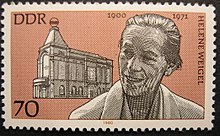fiction.wikisort.org - Actor
Helene Weigel (German: [heˈleː.nə ˈvaɪ̯gl̩] (![]() listen); 12 May 1900 – 6 May 1971)[1] was a German actress and artistic director.[2] She was the second wife of Bertolt Brecht and was married to him from 1930 until his death in 1956. Together they had two children.
listen); 12 May 1900 – 6 May 1971)[1] was a German actress and artistic director.[2] She was the second wife of Bertolt Brecht and was married to him from 1930 until his death in 1956. Together they had two children.
This article needs additional citations for verification. (September 2016) |
Helene Weigel | |
|---|---|
 Weigel in 1967, as "Mother" in Bertolt Brecht's play The Mother | |
| Born | Helene Weigel 12 May 1900 Vienna, Austria-Hungary |
| Died | 6 May 1971 (aged 70) East Berlin, East Germany |
| Occupation |
|
| Spouse | Bertolt Brecht |
| Children | 2 |

Personal life
Weigel was born in Vienna, Austria-Hungary, the daughter of Leopoldine (née Pollak) and Siegfried Weigel, an accountant-general in a textile factory.[1] Her family was Jewish.[1] She and husband Brecht had two children, Stefan Brecht and Barbara Brecht-Schall. Weigel was a Communist Party member from 1930.[1]
Career
Weigel became the artistic director of the Berliner Ensemble on 16 February 1949.[citation needed] She is best remembered for creating several Brecht roles, including: Pelagea Vlassova, The Mother of 1932; Antigone in Brecht's version of the Greek tragedy; the title role in his civil war play, Señora Carrar's Rifles; and the iconic Mother Courage.[citation needed]
Between 1933 and 1947, as a refugee from Adolf Hitler's Germany, she was seldom able to pursue her acting craft, even during the family's six-year period in Los Angeles.[citation needed] It was only with the foundation of the Berliner Ensemble in East Germany in 1949 that Brecht's theatre began to be recognized worldwide.[citation needed] She died in 1971, still at the helm of the company, and many of the roles that she created with Brecht are still in the theatre's repertoire today.[citation needed]
Death
Weigel died in East Berlin on 6 May 1971, six days before her 71st birthday.[1]
Notable understudies
- Ingrid Pitt, British-Polish actress
References
- "Helene Weigel | Jewish Women's Archive". Jwa.org. Retrieved 1 January 2013.
- "Helene Weigel". BFI.
External links
- Berliner Ensemble
- Jennifer Marston Willia, Biography of Helene Weigel, Jewish Women Encyclopedia
- Helene Weigel at IMDb
На других языках
[de] Helene Weigel
Helene Weigel (eigentl. Weigl, * 12. Mai 1900 in Wien, Österreich-Ungarn; † 6. Mai 1971 in Ost-Berlin) war eine österreichisch-deutsche Schauspielerin und Intendantin des Berliner Ensembles. Ihre Bedeutung für das Gegenwartstheater geht auf ihr ungewöhnliches schauspielerisches Talent und die später daraus entwickelten Darstellungstechniken für das epische Theater Bertolt Brechts zurück. Ihr gestisches, leises und erzählendes Spiel war in der Weimarer Republik auch ein Gegenentwurf zur lautstarken NS-Propaganda. Als weitere große Leistungen gelten Aufbau und Erhalt des Berliner Ensembles mit dem eigenen Haus „Theater am Schiffbauerdamm“, der Schutz von Brechts Werk vor Zensur, die umfangreiche Dokumentation von Brechts Arbeit sowie die in Zusammenarbeit mit dem westdeutschen Suhrkamp-Verlag betriebene Gesamtausgabe.- [en] Helene Weigel
[es] Helene Weigel
Helene Weigel (12 de mayo de 1900 en Viena – 6 de mayo de 1971 en Berlín Este)[1] fue una de las actrices más importantes del teatro alemán del siglo XX, maestra y directora del Berliner Ensemble[cita requerida] y la segunda esposa del autor Bertolt Brecht.[2][ru] Вайгель, Хелена
Хелена Вайгель (нем. Helene Weigel; 12 мая 1900, Вена, — 6 мая 1971, Берлин) — немецкая актриса и театральный администратор, вторая жена Бертольта Брехта.Другой контент может иметь иную лицензию. Перед использованием материалов сайта WikiSort.org внимательно изучите правила лицензирования конкретных элементов наполнения сайта.
WikiSort.org - проект по пересортировке и дополнению контента Википедии